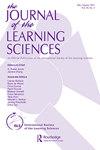职前科学教师早期教学中的认识论框架
IF 3.9
1区 教育学
Q1 EDUCATION & EDUCATIONAL RESEARCH
引用次数: 0
摘要
摘要背景在最近科学教育研究的背景下,以及如何最好地支持科学教师的持续斗争中,由教师激活的认识论资源集组成的认识论框架已成为研究的一个重要焦点。然而,在撰写本文时,没有研究可用于识别职前科学教师(PSTs)激活的认识论框架。方法在本研究中,我们使用定性研究方法,研究并应用编码方案来识别10名pst在其早期教学中的认识论框架,作为科学教学方法课程的一部分。每个PST的三次观察和三次访谈是主要数据来源。我们发现三个主要的认识论框架被激活。此外,我们确定了这些框架被激活的情境,其中情境可以被理解为具有不同可能维度特征的情境,在这些维度中资源被激活。我们还描述了与特定认识论资源和识别框架的激活相关的PSTs注意到的动态。本研究是认识论框架的一个相对较新的应用,有可能帮助科学教师教育者更好地理解和支持PST的学习和实践。本文章由计算机程序翻译,如有差异,请以英文原文为准。
Preservice science teachers’ epistemological framing in their early teaching
ABSTRACT Background In the context of recent research in science education and continued struggles to understand how best to support science teachers, epistemological frames, made up of sets of epistemological resources teachers activate, have emerged as an important focus of research. However, at the time of this writing no research was available to identify the epistemological frames activated by preservice science teachers (PSTs). Methods In this research, using qualitative research methods, we studied and applied a coding scheme to identify 10 PSTs’ epistemological framing in their early teaching as part of a science teaching methods course. Three observations and three interviews of each PST served as primary data sources. Findings We found three main epistemological frames activated. Further, we identified the contexts in which these frames were activated, where contexts can be understood as situations characterized by different possible dimensions within which resources are activated. We also described dynamics noted by PSTs related to the activation of specific epistemological resources and identified frames. Contribution This research is a relatively new application of the epistemological framing framework that has potential to help science teacher educators better understand and support PST learning and practice.
求助全文
通过发布文献求助,成功后即可免费获取论文全文。
去求助
来源期刊

Journal of the Learning Sciences
Multiple-
CiteScore
10.70
自引率
5.30%
发文量
17
期刊介绍:
Journal of the Learning Sciences (JLS) is one of the two official journals of the International Society of the Learning Sciences ( www.isls.org). JLS provides a multidisciplinary forum for research on education and learning that informs theories of how people learn and the design of learning environments. It publishes research that elucidates processes of learning, and the ways in which technologies, instructional practices, and learning environments can be designed to support learning in different contexts. JLS articles draw on theoretical frameworks from such diverse fields as cognitive science, sociocultural theory, educational psychology, computer science, and anthropology. Submissions are not limited to any particular research method, but must be based on rigorous analyses that present new insights into how people learn and/or how learning can be supported and enhanced. Successful submissions should position their argument within extant literature in the learning sciences. They should reflect the core practices and foci that have defined the learning sciences as a field: privileging design in methodology and pedagogy; emphasizing interdisciplinarity and methodological innovation; grounding research in real-world contexts; answering questions about learning process and mechanism, alongside outcomes; pursuing technological and pedagogical innovation; and maintaining a strong connection between research and practice.
 求助内容:
求助内容: 应助结果提醒方式:
应助结果提醒方式:


